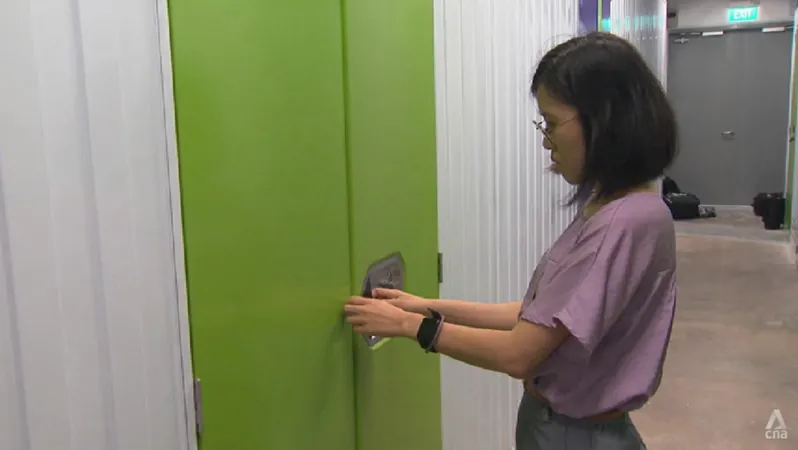
Businesses in Singapore Race for Climate-Controlled Storage Amid Weather Woes
2024-12-09
Author: Mei
The Cold Storage Boom
Air-conditioned storage not only helps in prolonging the shelf life of perishable goods but also shields various products from potential damage. Florist Cindy Koo, who runs a booming online business for fresh and preserved flowers, has found herself investing around 15% more for a climate-controlled unit compared to a standard one. Operating from her home in Aljunied, Koo discovered that the air-conditioned storage facility in Kallang Bahru significantly contributes to maintaining the quality of her flowers. "Humidity can ruin preserved flowers because the chemicals don't react well with moisture," she explained, emphasizing the importance of temperature regulation.
Recent trends suggest that small entrepreneurs like Koo are increasingly opting for self-storage units instead of hefty leases for larger warehouses. The upsurge in demand for air-conditioned storage units has been stark. Work+Store, a key player in the storage market, reported a staggering 10 to 30% increase in inquiries for these premium units from September of last year to March of this year. CEO Danny Wong noted that their facilities are currently 95% occupied, leading them to initiate plans for expansion.
Unpredictable Weather Driving Demand
Experts attribute the heightened interest in air-conditioned storage to Singapore's erratic climate. "Hot and humid conditions can wreak havoc on products such as leather, electronics, clothing, and even sealed food, which may spoil," Wong remarked. Customers insist on pristine conditions for their stored goods, making climate control an essential service.
Looking ahead, Work+Store plans to expand its air-conditioned storage capacity significantly by the end of next year, with plans for additional space equivalent to six basketball courts. Similarly, Storefriendly, another storage solutions provider, has reported that inquiries for its cool storage units—maintained at a steady 23 degrees Celsius—have more than doubled in the last six months. CEO Jes Johansen believes the ongoing wet weather has necessitated this rise in demand, reflecting how closely business needs align with changing environmental conditions.
Even niche markets are feeling the impact. Specialty items like wine require even cooler environments, necessitating storage at around 13 degrees Celsius. As Johansen noted, maintaining optimal humidity levels is crucial for products intended for long-term storage, further underscoring the shift towards climate-controlled solutions.
To keep pace with demand, Storefriendly is also doubling its number of locations in the next two years, signaling a promising growth trend in the sector.
Conclusion: The Future of Storage Solutions
In summary, as climate unpredictability becomes the new norm, air-conditioned storage spaces are no longer a luxury but an essential service for businesses in Singapore. Entrepreneurs who prioritize the longevity and quality of their products are increasingly making the smart choice to invest in these climate-controlled units, paving the way for a new standard in storage solutions. With demand showing no signs of waning, the future looks bright for businesses offering these vital services amidst the changing climate landscape.

 Brasil (PT)
Brasil (PT)
 Canada (EN)
Canada (EN)
 Chile (ES)
Chile (ES)
 España (ES)
España (ES)
 France (FR)
France (FR)
 Hong Kong (EN)
Hong Kong (EN)
 Italia (IT)
Italia (IT)
 日本 (JA)
日本 (JA)
 Magyarország (HU)
Magyarország (HU)
 Norge (NO)
Norge (NO)
 Polska (PL)
Polska (PL)
 Schweiz (DE)
Schweiz (DE)
 Singapore (EN)
Singapore (EN)
 Sverige (SV)
Sverige (SV)
 Suomi (FI)
Suomi (FI)
 Türkiye (TR)
Türkiye (TR)